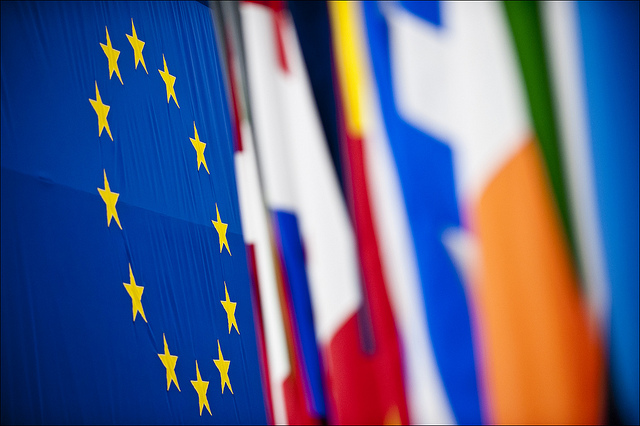Please support our coverage of democratic movements and become a monthly supporter of rabble.ca.
The great French poet Victor Hugo speaking to an international peace conference in 1849 called for the establishment of a United States of Europe. With the blood hardly dry after World War II ended in Europe in 1945, a group of French thinkers, notably Jean Monnet, drew up plans for European economic co-operation.
The Treaty of Rome in 1957 marked the creation of the six-nation European Economic Community (or European Common Market). France, Italy and (then) West Germany joined Belgium, the Netherlands, and Luxembourg. The three small countries had already taken the first steps to economic integration, the Benelux project.
For the dreamers of Europe, the coming together of former enemies overshadowed the adoption of freer currency trading, lowering of tariff barriers, and freer movement of capital. The idea was that economic liberalism would produce lasting peace by making war impossible among peoples whose economies were intertwined.
For those who had witnessed the carnage of two giant wars, it was obvious: building Europe was the noblest of projects.
Today the European Union counts 28 members. It is still governed by treaty (the Maastricht Treaty of 1992 formally created the European Union).
Europe remains primarily an economic space, given a distinctly neoliberal character by Mastrich, accentuated by the introduction of the euro, the common currency adopted by 18 of the 28 states, and by the recent two Single Market Acts.
The European Union has no formal constitution, independent head of state, or directly elected government, yet by virtue of its regulating authority it is a big part of everyday life for its over 500 million residents.
As an impressive group of thinkers including French economist Thomas Piketty has argued, the European project badly needs to be updated and improved. Identifying debts as “national” inside a currency union encourages speculation against the bonds of weaker countries, not access to borrowing on fair terms. A monetary policy designed to stifle inflation makes no sense in a world dominated by deflationary pressures. Austerity is another way of saying staggering youth unemployment, and precarious employment.
The results of the May 25 European Parliament elections revealed an indifference to the European project, and worse.
The telling result was the rates of abstention from voting, as high as 87 per cent in Slovakia, 81 per cent in the Czech Republic, and 77 per cent in Poland. Only Belgium (10 per cent), Luxembourg (10 per cent), Ireland (48 per cent), Denmark (44 per cent) Greece (42 per cent), Italy (40 per cent), and Malta (25 per cent) showed abstention rates below 50 per cent.
Worse was that the crypto-Fascist and Europhobic National Front led the polls in France with 25 per cent of the vote, and 24 of 74 seats, while the anti-European United Kingdom Independence Party (UKIP) won 28 per cent of the U.K. vote, and 23 of 73 seats.
Overall the Eurosceptics stayed home, while those who want change voted for small parties of the left or right. The exception was Italy, which gave a healthy 35 per cent of the vote to the left of centre governing party, 15 percentage points more than in the last general Italian election.
The new 751-seat European Parliament will be dominated by Christian Democrats (214 seats), and Social Democrats (191 seats). Of the others, Liberal Democrats hold 64 seats, Greens 52, Conservatives 46, and Europe Left 45. The national sovereignty group totals 36. Of the various remaining parties, those unable to group (it takes 25 elected members to form a parliamentary group) include the French National Front, which the British UKIP refuse to sit with because of FN anti-semitism, and the Greek Neo-Fascists, which the FN reject as unsuitable seatmates.
George Orwell wrote that the real schism in political regimes was between authoritarian and libertarian. Undoubtedly, the imposition of neoliberal economics by the EU treaty has repressed political expression, replacing the give and take of public negotiations with a regulatory process dominated by corporate lobbies, and carried on in the spirit of protecting investors.
European national leaders are reluctant to give up power to a central authority, thus a federal Europe is unlikely to emerge from normal European politics: periodic national summits.
Every time Europe has gotten to the stage where it was ready to go beyond being an economic space, rather than proceed with political integration, summit leaders have voted to take on new members.
It is hard to practice open politics in a space without an identifiable political face, or elected executive, let alone an engaged citizenry. So long as social democratic market economics remain indistinguishable from neoliberalism expect European discontent to continue.
Europe was not the only big project Victor Hugo championed; ending capital punishment was another. It required more than 100 years for Socialist France to box up the guillotine, following the election of François Mitterrand as president in 1980.
Despite disenchantment, there is no reason to think socialist Europe has said its last word on European integration, or that the utopia imagined by the poet Hugo no longer inspires Europeans.
Duncan Cameron is the president of rabble.ca and writes a weekly column on politics and current affairs.
Photo: European Parliament/flickr



